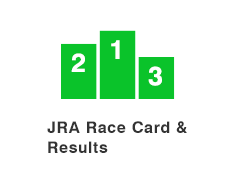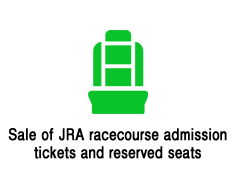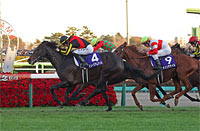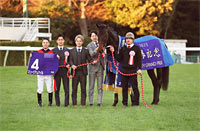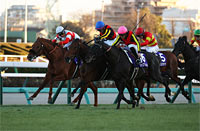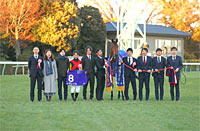Arima Kinen (The Grand Prix) (G1) - Data Analysis
National event that brings together stellar lineup of top runners
Looking back at previous Trifecta payouts in the Arima Kinen (The Grand Prix), we see that the last payouts above 100,000 yen and 200,000 yen occurred in 2015 (125,870 yen) and 2008 (985,580 yen), respectively. In last year’s race, Do Deuce triumphed backed by win odds of 5.2 (2nd favorite), producing a Trifecta payout of 42,110 yen—an outcome more or less in line with expectations. This year again, the big question is whether one of the fancied runners will live up to expectations, or whether a dark horse will take us all by surprise and deliver a major upset. Let’s now analyze some features shared by successful runners in this race based on results over the last 10 years.
Highly favored runners perform fairly well
Looking at performances by runners over the last 10 years in terms of favoritism, we find that race favorites achieved a Top 3 ratio of 70.0%, while runners backed as 2nd and 3rd favorite both had a solid Top 3 ratio of 50.0%. Meanwhile, runners backed as 6th-10th favorite achieved a Top 3 ratio of 14.0%, while those backed as 11th favorite or lower had a Top 3 ratio of only 1.7%. In other words, we should generally place our trust in runners with higher favoritism in this race. [Table 1]
[Table 1] Performance by favoritism (last 10 years)
| Favoritism |
Performance
[1st-2nd-3rd-4th or lower] |
Win ratio |
Top 2 ratio |
Top 3 ratio |
| 1st favorite |
5-1-1-3 |
50.0% |
60.0% |
70.0% |
| 2nd favorite |
2-1-2-5 |
20.0% |
30.0% |
50.0% |
| 3rd favorite |
1-1-3-5 |
10.0% |
20.0% |
50.0% |
| 4th favorite |
1-0-2-7 |
10.0% |
10.0% |
30.0% |
| 5th favorite |
0-2-0-8 |
0% |
20.0% |
20.0% |
| 6th-10th favorite |
1-4-2-43 |
2.0% |
10.0% |
14.0% |
| 11th favorite or lower |
0-1-0-59 |
0% |
1.7% |
1.7% |
Watch horses aged 5 or below
Looking at performances by runners over the last 10 years in terms of age, we observe that three-year-olds enjoyed the highest Win ratio, Top 2 ratio, and Top 3 ratio. Meanwhile, runners aged 7 or above produced zero Top 3 finishers, and the only six-year-old to finish in the Top 3 was 2018 third-place finisher Cheval Grand. We should therefore not expect too much from runners aged 6 or above. [Table 2]
[Table 2] Performance by age (last 10 years)
| Age |
Performance
[1st-2nd-3rd-4th or lower] |
Win ratio |
Top 2 ratio |
Top 3 ratio |
| 3 |
4-3-2-16 |
16.0% |
28.0% |
36.0% |
| 4 |
3-5-1-39 |
6.3% |
16.7% |
18.8% |
| 5 |
3-2-6-40 |
5.9% |
9.8% |
21.6% |
| 6 |
0-0-1-22 |
0% |
0% |
4.3% |
| 7 |
0-0-0-9 |
0% |
0% |
0% |
| 8 |
0-0-0-3 |
0% |
0% |
0% |
| 9 |
0-0-0-1 |
0% |
0% |
0% |
Runners starting in a bracket slightly inward relative to center achieved the highest success ratios
Looking at performances by runners over the last 10 years in terms of bracket number, we note that runners starting in Bracket 5 enjoyed the highest Win ratio, Top 2 ratio and Top 3 ratio. Meanwhile, runners starting in Brackets 7 and 8 produced zero winners, while those starting in Bracket 1 and 6 both had a Top 3 ratio of only 15.0%. In other words, we should focus on runners starting in a bracket slightly inward relative to center. [Table 3]
[Table 3] Performance by bracket number (last 10 years)
Bracket
number |
Performance
[1st-2nd-3rd-4th or lower] |
Win ratio |
Top 2 ratio |
Top 3 ratio |
| 1 |
1-1-1-17 |
5.0% |
10.0% |
15.0% |
| 2 |
1-2-1-16 |
5.0% |
15.0% |
20.0% |
| 3 |
2-2-1-15 |
10.0% |
20.0% |
25.0% |
| 4 |
2-0-2-16 |
10.0% |
10.0% |
20.0% |
| 5 |
3-2-1-14 |
15.0% |
25.0% |
30.0% |
| 6 |
1-1-1-17 |
5.0% |
10.0% |
15.0% |
| 7 |
0-1-2-17 |
0% |
5.0% |
15.0% |
| 8 |
0-1-1-18 |
0% |
5.0% |
10.0% |
Finish in previous race is a decisive factor
Looking at performances by runners over the last 10 years in terms of finish in the previous race, we find that runners that had finished 5th or higher in their previous race, achieved a Top 3 ratio of 26.7%. Meanwhile, runners that had finished 6th or lower produced zero winners, and had a Top 3 ratio under 10%. We should accordingly sharply raise our expectations of runners that have performed well in their previous race. [Table 4]
[Table 4] Performance by finish in previous race (last 10 years)
| Finish in previous race |
Performance
[1st-2nd-3rd-4th or lower] |
Win ratio |
Top 2 ratio |
Top 3 ratio |
| 5th or higher |
10-6-8-66 |
11.1% |
17.8% |
26.7% |
| 6th-9th |
0-2-1-28 |
0% |
6.5% |
9.7% |
| 10th or lower |
0-2-1-36 |
0% |
5.1% |
7.7% |
Seek out the winner!
Interval since previous race and other factors are important indicators
The last 10 winners all entered the race three to eight weeks after their previous race. We therefore need to discount runners that are entering the race after an extremely short interval since their previous outing, and runners coming from a rest period. Other shared features among the 10 winners were that they were all aged 5 or below, that they all started in Brackets 1-6, and that they all had finished in the Top 4 of their previous race. This suggests we should also take into consideration the trends shown in Tables 2, 3, and 4. [Table 5]
[Table 5] Winners’ interval since previous race, age, bracket number, and finish in previous race (last 10 years)
| Year |
Winner |
Interval since
previous race |
Age |
Bracket
number |
Finish in previous race |
| 2014 |
Gentildonna |
Three weeks |
5 |
2 |
4th |
| 2015 |
Gold Actor |
Six weeks |
4 |
4 |
1st |
| 2016 |
Satono Diamond |
Eight weeks |
3 |
6 |
1st |
| 2017 |
Kitasan Black |
Three weeks |
5 |
1 |
3rd |
| 2018 |
Blast Onepiece |
Eight weeks |
3 |
4 |
4th |
| 2019 |
Lys Gracieux |
Seven weeks |
5 |
3 |
1st |
| 2020 |
Chrono Genesis |
Seven weeks |
4 |
5 |
3rd |
| 2021 |
Efforia |
Seven weeks |
3 |
5 |
1st |
| 2022 |
Equinox |
Seven weeks |
3 |
5 |
1st |
| 2023 |
Do Deuce |
Three weeks |
4 |
3 |
4th |
(Masaya Ibuki)
|







